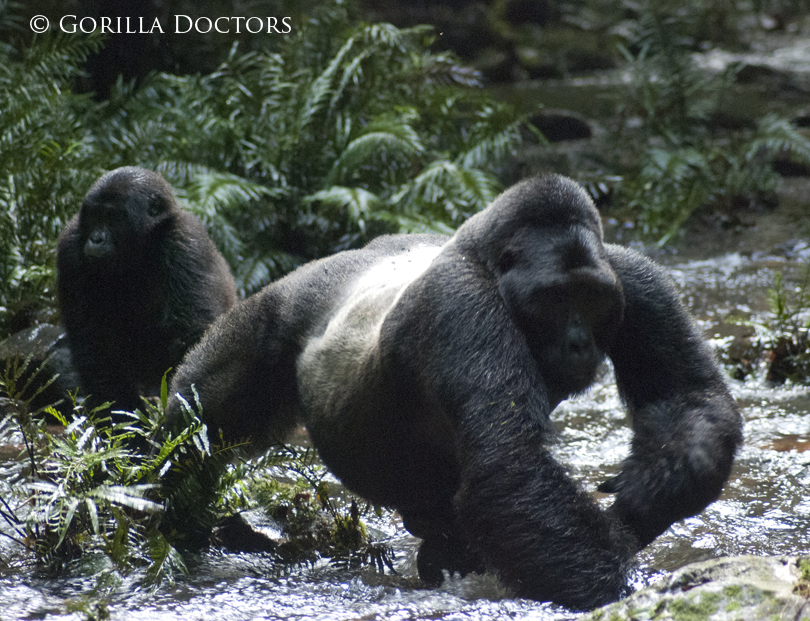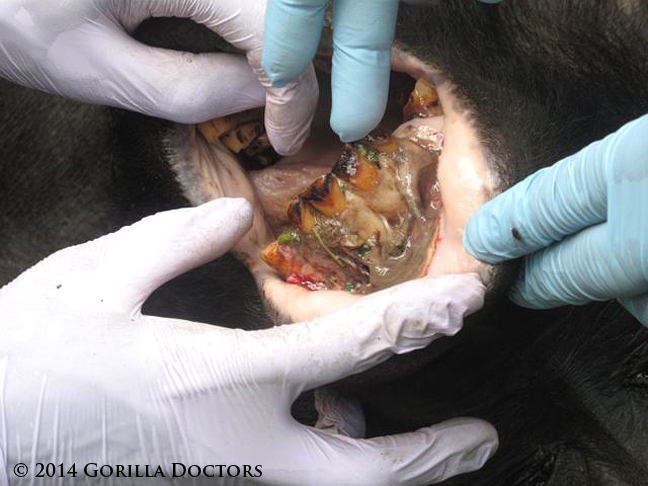Silverback Mwirima Passes Suddenly, Bwindi Loses Another Group Leader
By Gorilla Doctors Staff on Friday, March 7th, 2014 in Blog.Sadly, just 4 short weeks after the Bwindi population lost dominant silverback Mishaya to intestinal torsion on February 3rd, another silverback leader passed away suddenly. Mwirima, the leader of the Rushegura mountain gorilla group, became ill and was no longer traveling with his group members when the Gorilla Doctors were notified. Drs. Fred and Jan, along with UWA veterinarian Dr. Patrick intervened to treat the ailing silverback, but unfortunately it was too late and he passed soon after.
 Dominant silverback Mwirima, leader of Rushegura group in Bwindi Impenetrable National Park.
Dominant silverback Mwirima, leader of Rushegura group in Bwindi Impenetrable National Park.
by Dr. Fred Nizeyimana
“The Uganda Wildlife Authority (UWA) reported that Mwirima was lethargic and his condition had greatly deteriorated on February 28, 2014. He had been ranging outside of his group approximately 6 days. Trackers monitoring the silverback had reported that Mwirima was unable to move and had remained in his night nest for the whole day. He was seen feeding slightly for a short time and was very emaciated. I had a discussion with UWA veterinarian Dr. Patrick Atimnedi about Mwirima’s condition and discussed Mwirima’s case further with Gorilla Doctors Regional Veterinary Manager Dr. Jan Ramer. We arranged to go and assess his condition and do a diagnostic/supportive care intervention on March 2nd.
Drs. Jan, Patrick and I, accompanied by wardens Amusa Chemonges and Raymond Kato and UWA trackers found Mwirima in the Kanyasimu area of the forest, about 50 meters behind the park headquarters in Buhoma. At this time, Rushegura group was ranging over 10 kilometers away. He was alone and appeared very frail and dehydrated. There were no visible external injuries, but his body condition was very poor, his stomach was flat (indicating he had not fed in some time), there was muscle wasting on the limbs, back and head, his upper lip was slightly swollen and his breathing was very shallow. We made the decision to intervene for both diagnostic and supportive care purposes.
 Silverback Mwirima, lethargic and and exhibiting significant loss of body condition.
Silverback Mwirima, lethargic and and exhibiting significant loss of body condition.
Mwirima was darted with anesthesia at 10:34am and the silverback was fully induced at 10:30am. Upon physical examination, Mwirima had no palpable masses in his abdomen, but he was severely dehydrated. His teeth were very worn, especially the canines and incisors and there was a necrotic and infected wound on his upper lip exposing approximately 2 centimeters of maxillary bone.
 During the intervention, Gorilla Doctors found a very infected, necrotic wound on his lip.
During the intervention, Gorilla Doctors found a very infected, necrotic wound on his lip.
The wound was debrided by cutting off all of the infected and dead tissue. He was given antibiotic, anti-parasitic, and anti-inflammatory medications, as well as subcutaneous fluids. Samples were collected for laboratory analysis; results of blood tests indicated severe anemia, low albumin/low protein and infection or septicaemia.
The Hypoalbuminemia could be indicative of liver failure or diseases such as cirrhosis or chronic hepatitis. It can also present as part of the nephrotic syndrome, in which protein is lost in the urine due to kidney damage. Low albumin levels can be an indicator of chronic malnutrition or protein losing enteropathy.“
The field team was well aware that prognosis after the intervention was very grave, but the Gorilla Doctors did everything they could to save this silverback’s life. Intense monitoring continued, but sadly, Mwirima passed away the following morning.
You can follow the Gorilla Doctors health monitoring efforts on our Facebook page, where we post photos and notes from our monthly visits.
Please consider supporting us by making a secure online donation. Every dollar you give goes to directly supporting our gorilla health programs and One Health initiative. Thank you for your generosity.


 Donate
Donate